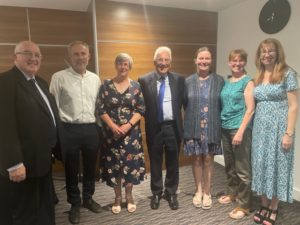Parliamentarians and faith and belief groups join calls to attract a new generation of teachers to the subject
A campaign to attract a new generation of RE teachers has kicked off with teaching groups, religious organisations and parliamentarians stressing the importance of the subject for preparing students for life in modern Britain.
As of January, UCAS data show that teacher recruitment for all subjects is down 22% from last year. However RE stands out, being down a third of applicants from the last recruitment cycle.
Government inaction over recruiting teachers to RE has been blamed. The Department for Education (DfE) has so far missed its target for the recruitment of RE teachers in nine of the last ten years.
Despite this year’s fall in applicants, the subject continues to grow in popularity. Over the last five years entries to the GCSE have stood around an average of 250,000 with entries to the full course GCSE rising by 30% over the last decade.
The recruitment campaign – entitled ‘Beyond the Ordinary’ – draws attention to the academic and knowledge rich approach of the subject to life’s big questions, and will seek to attract a set of talented graduates up to the task of getting young people to grips with the complex nature of modern belief.
Kathryn Wright, Chief Executive Officer of Culham St Gabriel’s Trust, which is supporting the campaign, said: “Religious education is an important curriculum subject enabling children and young people to navigate our complex multi religious, multi secular society. Everyone has a worldview, and it’s important we prepare young people to become free thinking, critical participants in public discourse, who can make informed judgements about matters of religion or belief and reflect meaningfully on the big questions in life.”
We are looking for ambitious graduates from a range of humanities and social science subjects who can deliver an academic and rigorous curriculum aimed at getting young people to think critically about their own beliefs and those of others.”
Last March, the Father of the House, Sir Peter Bottomley MP hosted a roundtable on the future of the subject. In October, a Westminster Hall Debate saw MPs and Peers from across the House agree on its importance for life in modern Britain as well as express concern around a lack of government support for the subject.
Lord Karan Bilimoria said: “The latest teacher recruitment figures are deeply worrying. Parents are concerned, schools are concerned and so too the young people are missing out.
“As a Champion for RE, I’ve heard numerous times from students that this is one of the few times in the classroom where they get to say what they think about the world around them. At present we face doing a disservice to a generation of young people ill-equipped to deal with the complexities of belief in Britain and the world beyond. This campaign is about getting the best humanities graduates into the classroom to help them deliver a modern RE curriculum reflective of belief in our society.”
Teacher training courses are open to graduates from a range of academic disciplines and from all sorts of diverse backgrounds, with Subject Knowledge Enhancement courses available from schools, universities or other providers.
Anyone looking for more information about training to be a RE teacher should visit https://cstg.org.uk/campaigns/teacher-recruitment/becoming-a-teacher



